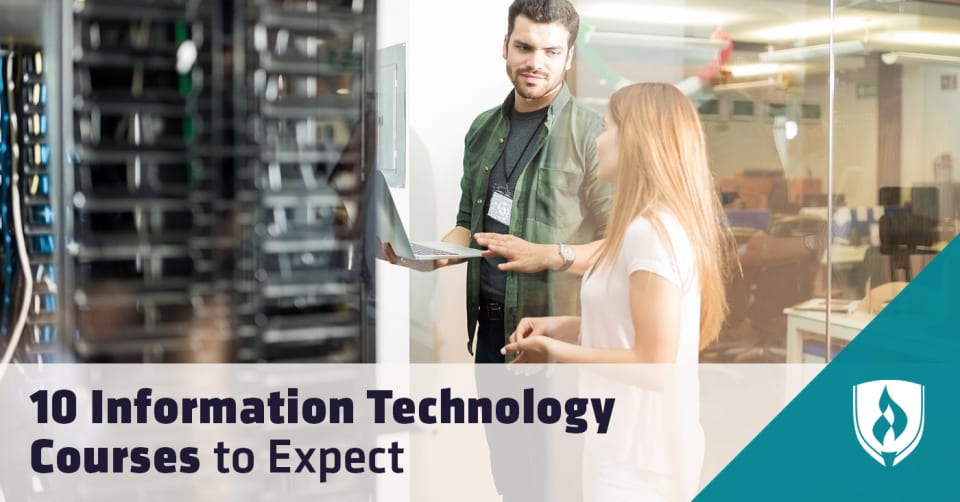
There’s a lot to like if you’re considering a career in information technology (IT). A large portion of our daily lives is dependent on functioning computer networking infrastructure and devices to keep things running smoothly. That means well-trained IT professionals play an important role in organizations all across the country—and that’s a pretty great place to position yourself.
While that’s good news for you, an aspiring IT professional, you likely still have a lot of questions about what to expect from your education and training. After all, this is what sets the foundation for an entire career.
So what can you expect from your Information Technology courses at Rasmussen College? In this article we’ll dive into IT courses from both the Information Technology Associate’s degree and Information Technology Management Bachelor’s degree program to give you a better idea of what to expect.
5 Foundational Information Technology Associate’s degree courses
The descriptions below will give you a sneak peek at each course so you know what to expect upon enrolling. Learn about the skills, software, training and certifications incorporated in each of these interesting IT courses.
1. Computer Technical Support
Technical support is the ground floor for a vast majority of information technology careers, and knowing how to professionally troubleshoot and manage user issues is key. In this course, you’ll learn how to approach the troubleshooting process, identify best practices in help desk support services and refine your customer service skills as you address user issues.
2. Hardware and Software
This dual-subject course is aimed at developing your overall comfort level and understanding of common hardware and software used in professional IT organizations. This subject features plenty of opportunities to deploy, configure and connect devices while documenting what you’ve learned along the way. The course includes a variety of practical scenarios for students to navigate and resolve—a big plus for when the time comes to apply these skills in a professional setting.
3. Operating Systems
While Microsoft Windows® might be the first thing that springs to mind for most when discussing operating systems, there are several options being utilized in professional IT settings today. This course will give you an opportunity to compare and contrast operating systems while applying practical skills like workstation image deployment and developing centralized workstation maintenance plans.
4. Introduction to Networking
Interconnected devices are the backbone of any modern business, and obviously an important subject for IT professionals to master. This course lays the foundation, with assignments covering the installation, deployment and configuration of physical networking hardware. Additionally students will learn to utilize wireless networking technology and apply their skills by designing a cost effective network for a small office environment.
5. Networking Security
You don’t have to look far to find examples of why network security is an important topic in information technology. Security breaches can lead to substantial damage for organizations, and IT professionals at all levels need a fundamental understanding of network security best practices. In this IT course, students will learn the principles of networking security, create a secure network environment, identify common types of security threats and learn what can be done to prevent security lapses and mitigate damage in the event of a failure.
5 Next-level Information Technology Management Bachelor’s degree courses
As you make the move up into Bachelor’s degree-level IT coursework, you’ll find a selection of courses that are geared for developing your business acumen and ability to navigate large-scale information technology projects.
1. Information Technology Business Management
Leading an information technology team requires more than just technical know-how—you also need to be able to confidently navigate important business management practices. This IT course will teach students the key business skills needed for organizational planning and large-scale IT project management. This includes learning how to define the scope of projects, evaluating procurement options, developing leadership competencies and effectively presenting your recommendations in a professional environment.
2. Management of Information Systems
Managing the needs of a large organization’s information technology infrastructure can be a complex undertaking. This course develops students’ toolkit for the evaluation, planning and management of IT resources. Students will learn how to evaluate current IT capabilities within an organization and develop plans for meeting future needs in a cost effective manner. This includes identifying and evaluating risk factors for different courses of action, strategies for identifying key stakeholder needs and developing effective communication skills when working with non-technical leaders in your organization.
3. Organizational Policy
Successful organizations need structure and policy to guide their actions. While this might sound simple in the abstract, setting an organization-wide policy structure takes careful consideration. This course challenges students to explore the ethical and legal considerations involved in setting IT policy. Along the way, you’ll develop plans for the implementation, auditing and enforcement of organization-wide policy.
4. Infrastructure and Hardware
What happens when an organization wants to move from their current IT infrastructure to cloud-based solutions? For one, a lot of careful planning and evaluation. This course equips students with the skills needed to manage extensive network changes. This includes creating plans for decommissioning legacy hardware, assessing risk and understanding the pros and cons of new enterprise-level solutions.
5. Information Technology Systems Analysis
Information technology business analysts play a key role in this field as they help bridge the divide between highly skilled technical teams and business stakeholders. This IT course provides students with a framework for approaching this role. You’ll learn how to map business processes to IT systems, create comprehensive project plans based on stakeholder needs and evaluate the effectiveness of project management methodologies like scrum and agile.
Ready to start your information technology training?
The Information Technology courses included in the programs at Rasmussen College were created to equip students with the skills needed to succeed at all stages of their IT careers. Whether you’re looking to get started in your first help desk role or have your sights set on advancing into an IT leadership position, the courses here will supply you with both the technical and transferable skills needed to excel.
If you’d like to learn more about these programs, check out the Rasmussen College Information Technology Associate’s degree page or the Information Technology Management Bachelor’s degree page.
EDITOR’S NOTE: This article was originally published in 2015. It has since been updated to include information relevant to 2020.




